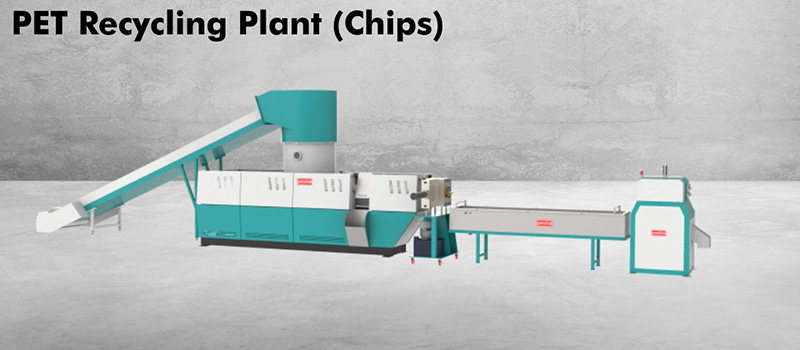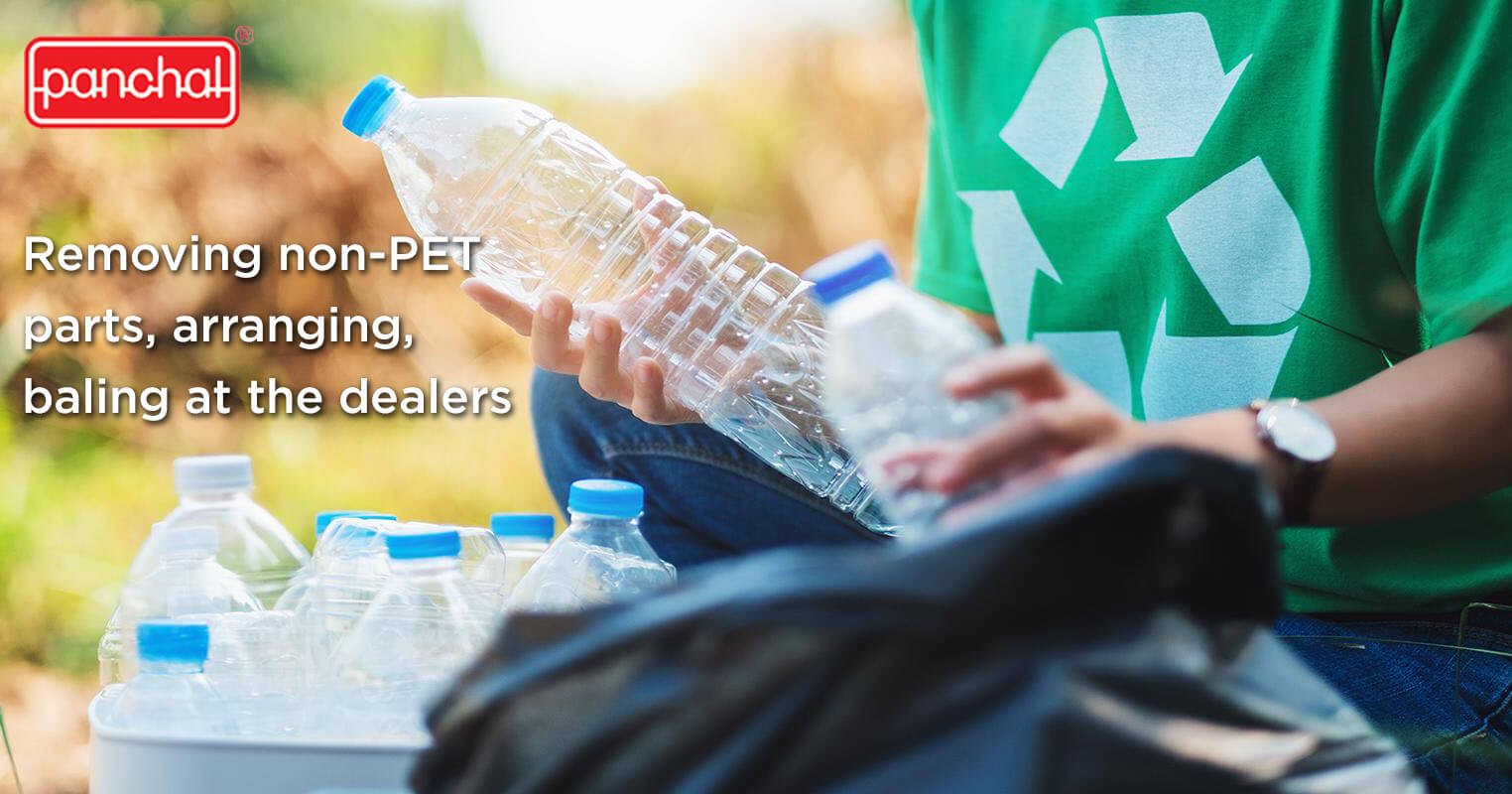Disposed of PET bottles are gathered, arranged, cleaned, destroyed, and made into ‘washed flakes,’ which are then used to deliver an assortment of items, beginning from polyester fiber, which is utilized for an assortment of utilizations like filling material for pads, cushions, and changed over to textures for use in apparel, upholstery, and so on Reused PET (a little rate) is additionally utilized for the assembling of PET ties, monofilament, sheets and so forth. PET bottle recycling business is now a very fast growing business.
Panchal has designed multiple machines which helps you in starting your own PET bottle recycling business.
There are countless individuals engaged with the PET reusing business, beginning from the waste authorities to Ragman to little to medium merchants, plastic recycler machine, and makers who utilize reused PET for different items. The accompanying diagram gives a shortsighted outline of the members in the PET reusing business in India.
Panchal EX-Series Extruder with strand Pelletizer is one of the proven and sturdy machine which give quality granule with guaranteed output.
There are different manners by which PET bottles arrive at the waste stream for reusing. Metropolitan strong waste (MSW) is one primary source. All plastic things are isolated from MSW and offered to a Ragman who has practical experience in plastic waste.
Squander gatherers additionally go straightforwardly to the sources (rail line stations, air terminals, cafés, lodgings, booths) to gather. However long PET bottles are isolated (alongside the dry waste) and disposed of, there is a high probability that they will be gotten and reused. There are a few angles that set PET bottles separated opposite other plastic waste.

To start with, PET bottles are effectively recognizable, consequently simple to get, sort, store and so forth Also, weight per bottle (unfilled) is sensibly high for the waste authorities to contribute their assets to gather them (when contrasted with amazingly low weight, little size squander, similar to chocolate coverings). There are 40+ enormous scope fabricating units all over India that utilization reused PET (washed flakes) as crude material.
Subsequently there is a solid interest for reused PET. A kilogram of post-shopper PET bottles get the waste authorities Rs 14-15/kg (costs shift occasionally; this value point was recorded when meetings were led between May-Aug 2016)
The ragmans get blended plastic waste. They run arranging activities, where individuals sort the loss into polyethylene (PE), polypropylene (PP), smooth PP, HDPE, LDPE, PET and so forth This is done for the most part by visual examination, by exposing the plastic thing to a progression of ad libbed tests like touch, bowing, snapping, applying solvents and so on The various plastics are isolated and offered to various merchants. The ragmans get Rs 24-25/kg of PET bottles.
Merchants get anyplace between two or three hundred kgs to a couple of huge loads of PET bottles a day. Every single PET container is investigated thoroughly, through manual review. To start with, all shaded PET bottles (green, golden) are isolated and sold independently. Metal covers, rings (a component normal in PET bottles utilized for bundling alcohol and so on) are eliminated by hand.
There are numerous sorts of names applied on PET bottles—PP, PVC and so on PVC marks represent a specific issue, as they could genuinely endanger the fiber producing measure. [PVC and PET have a comparative thickness, subsequently it is hard to isolate by buoyancy; yet PVC and PET have diverse Internal Viscosities, which makes it hard to handle PET defiled with PVC.]
Hence all PVC names (recognized by sight) are taken out. Bottles produced using different plastics are taken out. When this is done, the bottles are baled—i.e., squashed to make minimized packs, each gauging 120-140 kgs. Baling makes it conceivable to move PET bottles productively—by making it conceivable to move 8-9 tons in a full-scale truck.
Each baling machine can bundle around 0.7-1 ton of PET bottles in a day. It takes around ten laborers (sorters, packers, balers) to deliver a huge load of baled PET bottles in a day.

The merchants get at Rs 24-25 for each kg. Furthermore, they bring about around 4 Rs for every kg as expenses in arranging and baling (costs incorporate work, power, pressing expenses, lease, and ‘lack’. Many PET bottles when they show up at the broker may contain non-insignificant measures of remaining fluids (water, juices, different refreshments, fluids put away in the container).
A portion of these fluids are exhausted during the arranging cycle. A portion of the fluids are squashed out during the baling interaction—all of which causes a misfortune in weight of the PET bottles-deficiency is the term used to indicate this misfortune. The dealers offer to the recyclers at Rs 30-31 for every kg (for white PET bottles; green bottles yield a marginally lower rate; golden PET bottles yield even lower).
Also read: How to start a Fabric Waste Recycling Business?
Trucks conveying parcels of PET bottles show up at the recyclers using PET bottle recycling machines. The parcels are opened and the arranging, cleaning measure starts from the very beginning once more. The bottles are put through different phases of manual, self-loader and programmed arranging, cleaning measures.
All PVC lables, bottles are eliminated. Any metal segment that may have sneaked in (like covers, rings, springs utilized in splash bottles and so forth) are persistently taken out. The bottles are destroyed, and the plastic (non-PVC plastics like PE, PP) segments are isolated by buoyancy. The flakes are exposed to additional washing, drying and are prepared (washed flakes) to be dispatched to the assembling units.
The washed flakes are dissolved and turned into filaments of different grades, and used to make PET sheets, monofilament, lash and so on
The cycle referenced above depicts how the reusing interaction would function in the coordinated area. There are a ton of units, plants that produce washed flakes of different characteristics and grades that are by and by took care of into other ‘casual’ units that produce a scope of polyester/PET items. For instance, in India, guidelines don’t permit reused PET to be utilized underway of bottles. However, there are units that use reused PET for creation of bottles—for the most part by blending a % of reused PET with virgin PET in delivering PET bottles. As can be speculated, it is hard to determine or remark on the quantity of such units, the volumes they handle and so forth Yet, they do exist. On the off chance that one assesses a portion of the bottles utilized by non-standard makers for putting away oils, refreshments and so on, the utilization of reused PET can be spotted by the slight yellow hint in such bottles.
Vipul Panchal has also explained How to start a Fabric Waste Recycling Business?
Call us on: +91 9824137266 | Mail us on: info@panchal-plastic.com | Or Contact Panchal Plastic today to discover Plastic Recycling Machine requirements with precision and reliability.
Reach Panchal Plastic now for quick enquiry for starting your own plastic recycling business.